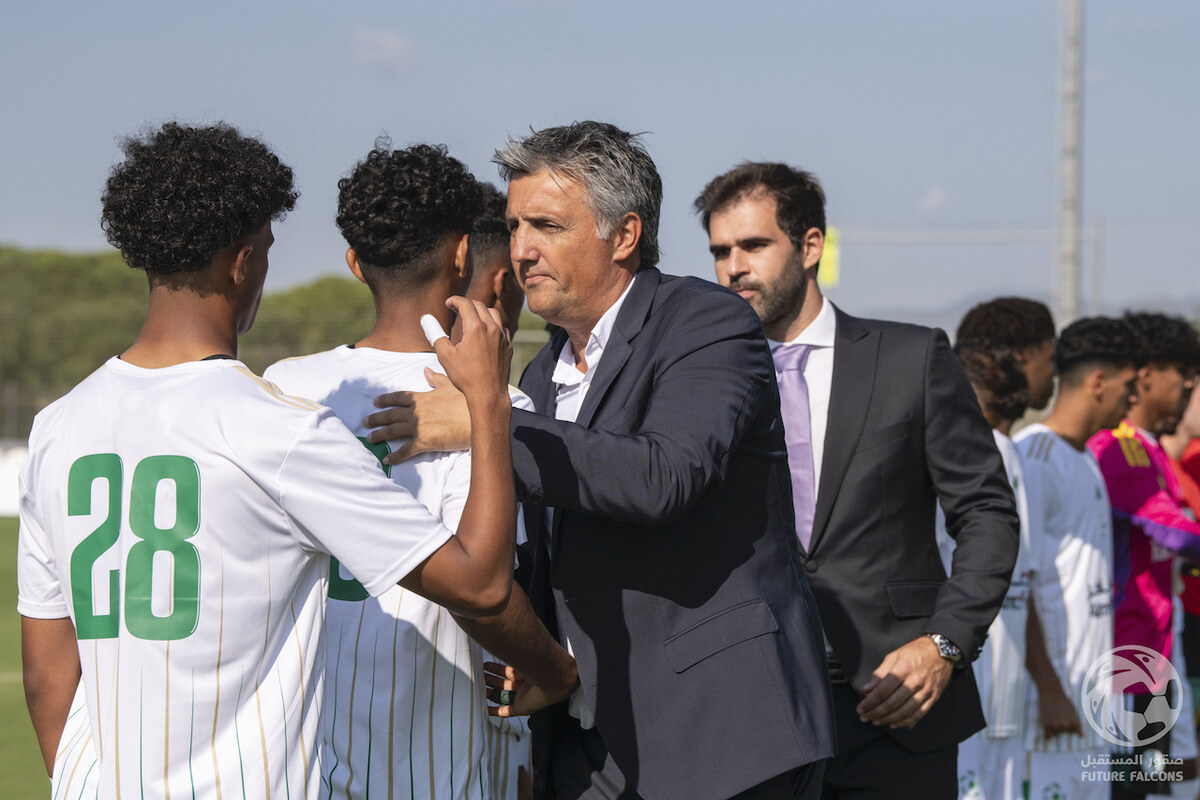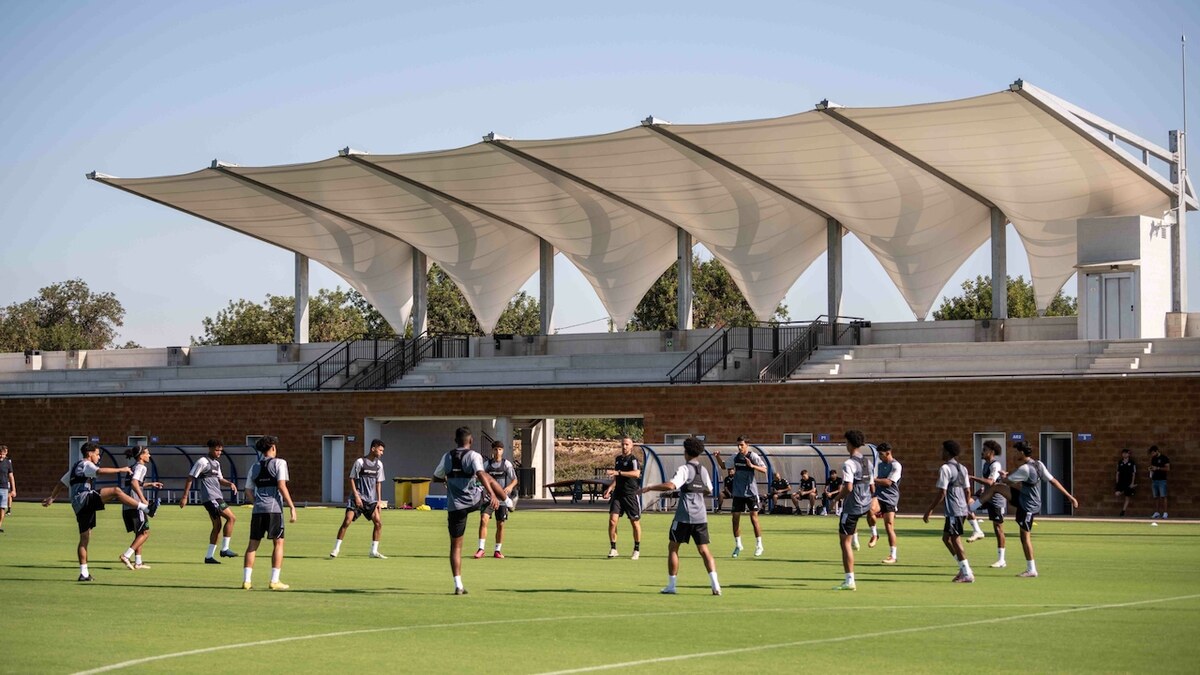RIYADH: With Saudi Arabia the only nation in the running to host the FIFA World Cup 2034, the Kingdom is stepping up efforts to develop the next generation of footballing talent.
Capitalizing on one of its strongest assets — its large youth population — the Kingdom has made significant strides in developing sporting talent, aiming to transform the country into a global football powerhouse.
The Future Falcons talent program, under the national governing body the Saudi Arabian Football Federation, was established in 2019. The program has led to young Saudi players being picked for European club teams, including recent transfers to Croatia’s NK Jadran Porec and Greece’s Kavala FC.

Romeo Jozak, Technical Director Future Falcons Program - Saudi Arabian Football Federation (SAFF)
Leading coach Romeo Jozak, the program’s technical director, told Arab News: “Saudi Arabian talent is enormous. It’s a huge country and there’s a lot of skills, football quality... I think the program is amazing to actually take the football talent of Saudi Arabia, bring it to Europe, and then get it into the competitive level.”
The program hosts a number of players selected by the federation and other national football teams. Originally focused on 18 to 20-year-olds, it recently expanded to include under-16s.
The under-16 national team will receive professional training for two consecutive seasons in Salou, Spain, beginning this year, with the goal of fostering their development as they start their professional football careers.
Jozak said that he hoped the inclusion of under-16 players will “open the door for the next year (and the years to follow) … to making it a little factory for the production of Saudi players, together with education.”
Collaborations with football academies and teams from around the world will provide Saudi players with opportunities for international training stints and exposure to different playing styles. These partnerships not only develop young players’ skills, but also broaden their footballing perspectives.

The country’s commitment to youth development is also evident in the partnerships with international clubs and football organizations showcased through the Future Falcons program. (Supplied)
Yazan Madani, 19, is one of the Future Falcons program players this past season that Al-Ahli have developed and helped to sign a professional contract for two years with FK Egnatia, current Albanian league champions.
Speaking to Arab News, Madani explained the reasons for wanting to pursue this career. “It all started when I was nearly five years old and expressed my passion for the sport. It became a key component of my life in general and my daily life in particular. I also expressed great passion for achieving all the goals I ever dreamed of turning into reality one day.”
Madani was familiar with the program for two years before joining, and had been eagerly waiting to be selected. “I finally managed to join a European club through the program.”
“I gained a lot of experience and skills at all levels. Playing against the best European and international clubs and being a tough opponent requires the players, along with the technical, administrative and medical teams, to exert great efforts and put in a lot of work on a daily basis. The preparation was conducted under the leadership of the general director of the program, Ghassan Felemban. I would also like to thank Al-Ahli club and its academy director, Qassem Al-Tayeb, for providing me with the support and cooperation I needed to achieve these goals in my sporting career,” Madani said.
Jozak said that in 27 years of involvement with football, he has yet to see an elite program to match the Saudi government’s initiative.
“Taking the national team to Europe, to the center of the football world, giving them everything, and also assuring the education for the young players. This is something that is truly amazing,” he said.

Yazan Madani, 19, is one of the Future Falcons program players who signed a professional contract for two years with FK Egnatia, current Albanian league champions. (Supplied)
This grassroots approach ensures that talent is spotted early and given the opportunity to develop through rigorous training programs that prepare players for the top level of international competition. A focus on scouting has already yielded results, with several young players making their mark in domestic and international competition.
Saudi youth players continue to make international headlines and compete in some of the biggest stadiums. While the Saudi under-23 team failed to reach the Paris Olympics earlier this year, they still showcased their skills, including a 5-0 victory over Thailand at the AFC U-23 Asian Cup.
The establishment of the Saudi Pro League Youth Academy, alongside various regional academies, is a cornerstone of the development initiative. Academies offer top-class facilities, professional coaching, and a structured training regimen, ensuring that young players receive the best possible start in their football careers.
One of the key elements of the strategy is an emphasis on scouting and recruitment. SAFF has developed a nationwide network to identify promising young players from local leagues and schools, including Mahd Academy.

The country’s commitment to youth development is also evident in the partnerships with international clubs and football organizations showcased through the Future Falcons program. (Supplied)
The academy was established in 2020 to develop young athletes in a variety of sports, and develop strategies to achieve sporting success regionally and internationally. Even though it was launched during the pandemic, more than 10,000 athletes registered with the academy through its online forum during its first year.
Jozak said: “In the current squad, we have three players from Mahd Academy. We have a couple of players from Al-Nassr Club, a couple of players from Al-Fateh, the same way we are using the talent of Mahd Academy.
“Speaking to people from there, the goal of Mahd Academy is to produce players for the national team, the same as us. So, we all have and should have the same goal in Saudi Arabia, and that is to feed and filter the talent to the national team.”

































